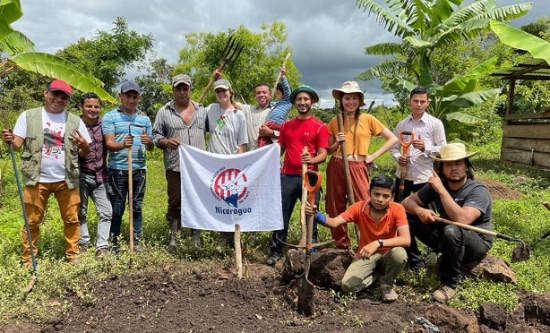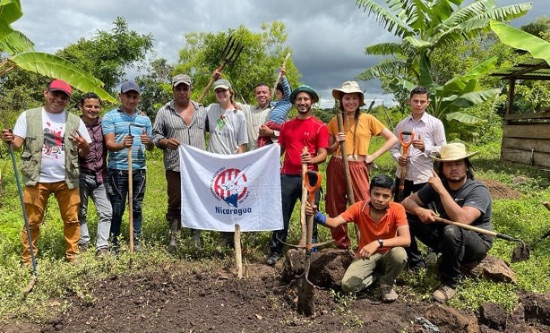
US imperialism has a long and bloody history of military intervention, occupation, coups and aggression in Nicaragua. Throughout the 20th century it imposed dictators to facilitate its looting and plunder. In the 1980s the US armed and funded violent far-right groups to destroy the revolutionary Sandinista forces and since the Sandinista Front returned to Presidency in 2007, the US has spent millions of dollars trying to overthrow the Nicaraguan government, including a campaign of terror in 2018 and attempts to derail subsequent elections. Since 2019 Nicaragua is under sanction by the US, Canada and the EU. Social organisations and revolutionaries in Nicaragua continue to organise against imperialism, in defence of their sovereignty and for socialism. FRFI met with Marlen Sanchez, Faustino Torrez and Erika Takeo, representing the international department of the Association of Rural Workers (ATC) Nicaragua, to learn more about this process.
FRFI: The ATC played a historic role in struggle against the Somoza dictatorship and in support of the Sandinista revolution. Can you give us an overview of this role as well as explaining what the ATC’s current goals and aims are?
Faustino Torrez: The ATC was officially constituted in 1978 by farm workers in the countryside in a struggle against capitalism and the Somoza dictatorship. The Sandinista revolution triumphed in 1979 and in the 1980s ATC was an important part of the social forces of revolution; we were a leading participant in the agrarian reforms [1981] as part of the process of the revolution and represented farm and rural workers in the new government.
In 1990 the Sandinistas lost the elections and Nicaragua entered a period of neoliberalism and right-wing governments. The ATC was part of the struggle against the bourgeoisie in this period, until the Sandinista Front came back to power in 2007.
Today, the ATC works on two fronts: the unions and the cooperatives. The ATC has at a departmental level 13 different union federations that come together to create a national federation. Currently there are about 75 unions and 80 cooperatives in the ATC. About 52,000 workers are organised into these unions and cooperatives. The ATC is the main point of reference for organised farm workers.
Erika Takeo: Every year there is a minimum wage increase of at least 8% in Nicaragua; this year it was 10%. The ATC is part of these negotiations between workers and the government. We work with local governments on health and safety measures and on working conditions, we represent workers if they face problems and we have a huge focus on training. We have had various training programmes such as one that trained workers in labour law.
FRFI: Could you expand on the international movement the ATC is part of and how it functions?
Marlen Sanchez: 30 years ago the ATC was a founding member of the international movement La Via Campesina that brings together social movements with a focus on food
sovereignty and political transformation. Today it has around 180 member organisations in 90 countries. In Latin America we have three regions: the Central American region, the South American region and the Caribbean region. Here in Central America there are nearly 40 participating organisations from six countries. There are member organisations in Europe and Britain (Land Workers’ Alliance).
There are different lines of work with the movement on local, national and international levels. On an international level, the ATC makes contributions for example by sharing our experiences with the literary campaign [1980], the agrarian reforms and the path to food sovereignty. Nicaragua is between 90%-100% food sovereign and that is in large part thanks to the agrarian reforms of the 1980s.
In Nicaragua we currently operate three schools that provide training in technology and agroecology. Training courses are two-year programmes that provide technical degrees and cater to people from organisations associated with the Via Campesina movement and these courses promote peasant agriculture linked to public policies and practices. We are currently focussing on strengthening these institutes. A big focus in them is political education – we study Marx, Engels and Lenin. Like Fidel said, there is an ongoing battle of ideas.
Finally, we are building an international network ‘Friends of the ATC’ and through this solidarity channel we coordinate brigades and internships here in Nicaragua.
FRFI: You touched on the agrarian reforms as a gain won by peasants and workers as part of the Sandinista revolution. What other improvements on the quality of life in Nicaragua do people feel as a result of the Sandinista Revolution and have these changed in recent years?
F: We had the first phase of the revolution from 1979 to 1990. There were many achievements from that period, but there was also imperialist aggression. Then we had 16 years of neoliberal governments until the Sandinistas were returned to government in 2007. Everything was going well until 2018. In 2018 there was a coup attempt led by: 1. the Vatican and Pope Francis, 2. North American imperialism and the EU and 3. some forces in Nicaragua that these groups funded. The government was able to successfully defend itself and we are recovering: a lot of people involved in the coup attempt have left the country. But it has left problems, like with sanctions from the US and the EU. In spite of this, we are making gains.
We have the highest level of electricity coverage in the region. During the Somoza dictatorship there was only about 45% of electricity coverage and today we have 99%. There has been a lot of investment in healthcare and the construction of hospitals: Covid didn’t impact us here as it did in much of Central America. We are almost completely food sovereign. In recent years there has been greater implementation of workers’ rights.
Since 2018 there has been an intensification of false news about Nicaragua and confusion among the international left. Some of this false news has been promoted by the so-called left. There are two ways to look at the left: socialism, or humanising capitalism. If you go with the second route, of humanising capitalism, you end up being friends with imperialism. In Europe the President of Spain says he is on the left, or the Labour Party in Britain, which say they are ‘on the left’ but they are not really. And in Latin America just look at Boric [President of Chile], or Petro [Colombia], or Amlo [Mexico]. Some people see these figures as being ‘on the left’. Those same people look at Daniel Ortega or Nicolas Maduro or Miguel Diez Canal and they say they are dictators.
Today Lula in Brazil has a problem: his campaign was run on a left platform but to remain in power he is now negotiating with groups on the right. In Nicaragua and internationally we are in a very difficult context to have a strong left. These are important topics that need to be worked on, explained and are part of the ideological debate. We need a progressive ideological debate that considers international developments such as the creation of a multi-polar world, the failure of the EU, the struggle for control over resources. The pathway out of all this is to construct socialism but here in Nicaragua we come up against imperialist aggression.
But the Nicaragua of today is incomparable to the Nicaragua under the Somoza dictatorship, or even Nicaragua during the neoliberal governments. We have made strides forward these past few years.
There is no capacity right now for the right-wing to win. If the elections were today, the Sandinistas would win the election.
FRFI: How do the sanctions affect people on the ground in Nicaragua? Have people or the state found ways to mitigate the effects of the sanctions?
M: Sanctions have affected the ability to budget for some social programmes related to production, healthcare and education. Social movement organisations have not been able to receive funding from groups in the US and money has to be triangulated via the EU, which creates extra work and complications.
But the government has been proactive in finding other sources of funding, for example through a developing relationship with China, which has helped in areas relating to production, roads, housing; and Russia, which has helped particularly with transportation and has sent us buses.
E: A lot of funds the government can’t get they are now getting from the Central American Bank for Economic Integration.
FRFI: What kinds of pressures do socialist elements in Nicaragua experience from capitalist forces within Nicaragua? What are the antagonisms?
M: In Nicaragua we have a mixed economy so private business can operate, but the social economy and the community and cooperative based economy is dominant and continues to grow. About 70% of the economy is social economy, production based at the family level, cooperatives and small farmers. A lot of our country is based on agricultural production, in part due to agrarian reforms which allowed the peasantry to gain access to land. Today about 42% of land is in the hands of small peasants.
The private sector focuses on production of agricultural-export products – banana, coffee, tobacco, palm, peanuts. Nicaragua was developed by colonialism and imperialism to export agricultural products; cacao too. The government policies have been focused on strengthening agriculture production and transitioning away from being a country just exporting raw materials and instead to manufacture those materials.
For example, with cacao, previously it was exported and then manufactured into chocolate in another country but now there is a lot of training for cooperatives in Nicaragua to manufacture it into chocolate here.
The government dedicates a budget towards these initiatives, for example a budget supporting technological transfer for small farmers, a budget specifically for training people from the countryside on how to transform these raw materials into other value-added products.
FRFI: Do workers’ movements feel the government supports their political goals? What relation does the FSLN government have to workers movements and property relations?
M: In short, yes. In the current phase of the government since 2007 until today there has been a very strong implementation for the rights of workers wherever they are working. This has been a central emphasis in this second phase of the revolution. This spreads across access to education and access to basic services, like water and electricity.
There are still many challenges. A big part of this government’s work has been to combat poverty and extreme poverty. We have been able to reduce the levels but poverty remains, so a continued challenge is reducing this. But we have made huge gains. The current approval rating of the government is 78%.
Fight Racism! Fight Imperialism! No 294, June/July 2023




